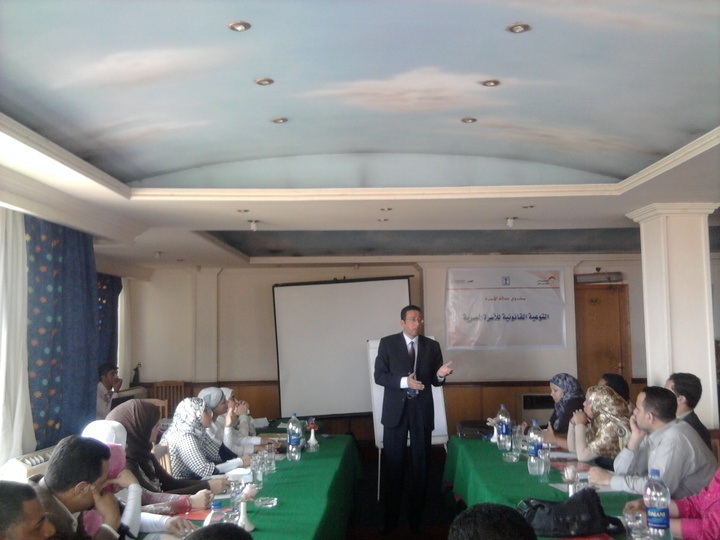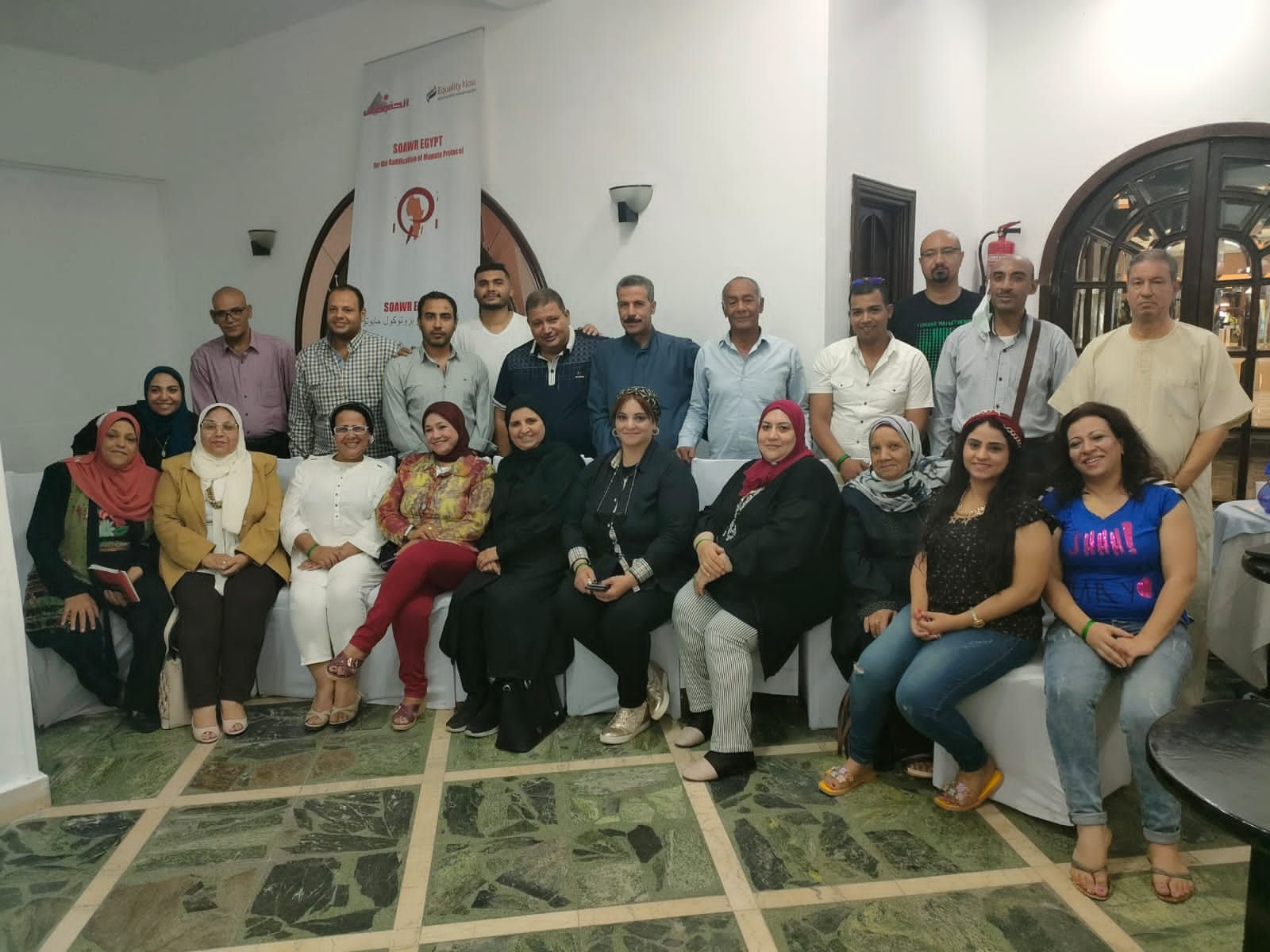
The right to education and fighting illiteracy
Although Egypt spent 11.9 % of its total public expenditures on education, the Egyptian education system faces many obstacles. The most important of these are high crowded classes, not abiding by specific standards for education process, gap between private and public schools and the lack of teaching and learning resources. Also there is a big difference between the education curriculum and the needs of labor market which lead to an increase in poverty and unemployment.
Eradicating illiteracy remains the most important goal of the state. Illiteracy rate has reached 29.6 %. The General Authority for Literacy and Adult Education succeeded in eradicating the illiteracy of (1,621,627) citizens during the period from 2011 to 2013.
Due to the above, the coalition calls for the following:
- The state shall continue its efforts for promoting educational quality and eradicating illiteracy especially in rural and poor areas according to a time plan and in collaboration with CSOs.
- The state shall start applying the constitution articles and amend the necessary laws concerning allocating a percentage of government spending to scientific research equivalent to at least 1% of the Gross National Product (GNP), which shall gradually increase to comply with international standards.
- The State shall provide free education in the various stages in the State’s educational institutions according to the Law.
- The State shall encourage and develop technical and technological education as well as vocational training, and expand all their types in accordance with international quality standards and in accordance with labor market needs.
- The right to housing:
The right to adequate housing became one of the biggest social problems in Egypt. The housing crisis in Egypt is not an economic crisis resulting from the deficit in the capabilities and resources, as far as the crisis is resulting from the absence of social justice in planning for housing over decades. Despite the government’s efforts to address the issue of housing including implementing new urban communities which reach 27 new communities and offering 28000 pieces of land according to the public lottery system in low prices and installment without interest, 15.5 millions of people still live in informal areas, at the time that there are millions of vacant housing units not used before.
Due to the above, the coalition calls for the following:
1- The state shall strengthen the national housing plan which upholds the environmental particularity and ensures the contribution of personal and collaborative initiatives in its implementation.
2- The State shall conduct a comprehensive national plan to address the problem of unplanned slums, which includes re-planning, provision of infrastructure and utilities, and improvement of the quality of life and public health.
4. The right to food:
According to the Central Agency for Public Mobilization and Statistics (CAPMAS), 30.1% of populations do not get their caloric needs and 28.9 % of children suffering from stunting. The government has made great efforts including ensuring access to high-quality bread for all citizens, providing subsidized goods through mechanized ration cards for ensuring arrival of support in-kind to those who deserve it in addition to setting prices guide for maintaining products prices within a specific range. However, the government still faces daunting challenges in supplying citizens with high-quality food products at low prices.
Due to the above, the coalition calls for the following:
1- The state shall facilitate economic access to adequate food. The rights and needs of all communities should be met; even people living in remote geographical locations.
2- The state shall keep monitoring prices of essential goods and revive mandatory pricing for reducing prices
3- The state shall draw up national plan for ensuring that water and sanitation facilities reach everyone and are maintained at a healthy standard.
5. The right to clean environment:
Egypt suffers from multidimensional environmental issues that may have negative impacts on the natural resources and endanger the citizen’s health. The environmental issues in Egypt include air pollution, water pollution, soil contamination and noise pollution. The government exerts efforts to increase green space, preserve farmland and reduce pollution in general. However, the lack of resources and security conditions prevent developing a strategy to overcome obstacles.
Due to the above, the coalition calls for the following:
- The state shall apply a strategy for the protection and conservation of the environment and strengthen mechanisms for sustainable development.
- The state shall increase the role of people in managing their natural resources and facilitate access to information concerning these resources.
- To minimizethe use of harmful pesticides and fertilizers for avoiding food contamination
- To conduct a regular monitoring for the state of environment in Egypt. This monitoring will enable stakeholders to actively participate in the planningprocess for natural resource management.
- The right to work and fighting unemployment:
The economic crisis of the past two years has worsened unemployment further; this has been a major driver of the ongoing protests and social unrest. Unemployment climbed to 13.4% in the third quarter of 2013 compared to 13.3% in the second quarter of the same year. Statistics indicated that Egypt’s unemployment rate averaged 8.9 % in 2010.This high levels of unemployment due to the closure of more than 1500 factories since 2011 uprisings.
Due to the above, the coalition calls for the following:
- The State shall draw up national plan for promoting job creation and reducing unemployment rates.
- The state shall amend its legislation with the aim of passing unified labor laws that govern the public and private sectors. These amendments shall preserve the rights of workers and admit the formation of independent trade unions.
- The state shall review the efficiency of the economic system and adjust market mechanism.
- The right to development:
The desired outcome of sustainable development has not been achieved in the Egyptian society t
hroughout the past years. There was not any national integrated plan for achieving development in all parts of the country due to lack of capabilities and the absence of a comprehensive development plan. Upper Egypt, desert and border areas are still marginalized and neglected areas although they have the essential elements needed for achieving sustainable development.
So, the coalition calls for the following:
- The state shall adopt a national strategy for sustainable development with the assistance and support of international society. The strategy shall takeinto consideration geographical and environmental balance and guarantee equality of opportunity for all citizens.
- The state shall develop comprehensive reform program. The program shall advance the role of women and youth and actively involve them in real community projects.
- The state shall develop a national strategy for the full implementation of the right to social security.
- The state shall guarantee social insurance and pension funds.
- The right to fight corruption:
Forms of corruption vary, but include misuse of government power for other purposes, extortion, graft, and embezzlement. According to Transparency International, Egypt ranked 114th out of 177 in the Corruption Perceptions Index. Within the fight against corruption, the interim President Adly Mansour issued a law 106-2013 that prohibits the conflict of the state officials’ interests. The law stipulates the establishment of a committee for the prevention of corruption and sets out the terms of reference for its establishment. This committee will be tasked with overseeing the implementation of the law.
Corruption was among the main engines behind the Egyptian Revolution. Nevertheless, corruption still remains a problem after the revolution.
So the coalition calls for the following:
- The state shall intensify its efforts to promote transparency and accountability and fight corruptions as a detriment that threatens the futureof society.
- Competent control agencies and organizations shall coordinate their activities in combating corruption, enhancing the values of integrity and transparency in order to ensure sound performance of public functions and preserve public funds.
- The state shall develop strategy for recovering looted funds abroad.
- The state shall promote electronic government services which separate between the service provider and the service recipient.
- Rights of the child:
Children in Egypt suffer from many serious problems affecting them including child labor, school drop-outs, violence against children, street children and lack of children’s participation in decision making that affects their lives. Also, the exploitation of children in political demonstrations has made matters worse. This problem requires urgent intervention for protecting children from further abuse during violent confrontations.
So, the coalition calls for the following:
- The state shall allocate a separate budget within the available resources, for the protection of child rights
- The state shall draw up a plan to address the dropout crisis.
- The state shall develop a National Street Children Strategy for prevention, withdrawal and reintegration of street children.
- The state shall undertake awareness-raising campaigns with a view to eradicating child labor.







